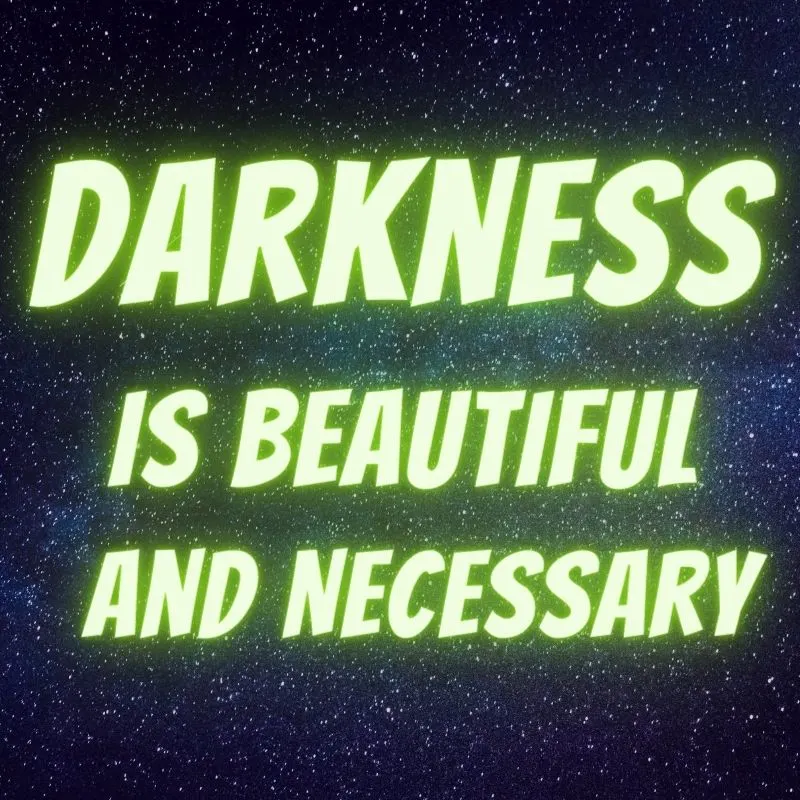The wonderful children’s book Sulwe by Lupita Nyong’o and Vashti Harrison ends with the realization that darkness — both in the sky and in skin color — is beautiful and necessary. Yet, so many of us persist in using the term “dark” or “darkness” as a metaphor for “bad things,” “evil” — or anything negative.
This is problematic, and has profound ramifications. It’s time to reexamine our use of the metaphor “darkness,” and to shift away from it. Here’s why.

Why Stop the “Darkness” Metaphor?
#1: It Perpetuates Racism
Most obviously, if our society is constantly associating darkness with bad things, this spills into our treatment of actual humans with darker skin. In other words, our use of the “darkness” metaphor to connote sad or difficult things supports racism.
An Example to Show Why It’s Offensive
Seem far-fetched? Let’s examine an example. Say a character in a book is described as having “dark moods.” Readers know that this phrase translates to “bad moods.” In this case, “dark” = “bad.”
Next, say a different character is described as having “dark skin.” What’s the logical translation of that second description, given the first? You’ve got it — whether we mean for this to happen or not (and most do not), the mathematical translation would be “bad skin.” Nope! This isn’t something we want to perpetuate!
No matter how much someone who uses the metaphor might insist that they didn’t mean for it to bleed into the realm of skin color, it does. Even as we try to shut off the association, the connotation lingers in the air. It impacts our thinking and feeling, and causes hurt.
#2: It’s Not an Accurate Metaphor
Another problem with the metaphor of “darkness” to describe negative things is that it’s simply not true with regard to the literal natural world and our interactions with it. In fact, literal darkness is undeniably useful and beautiful!
Would you like to live in a world where night did not exist, and it was bright light day outside 24-7? Of course not! Whole movies have been made about people going insane while living in an Arctic region where the sun never sets. Too much sun is not a good thing.
Think about all the wonderful parts of literal darkness. Darkness is calming and restful. It helps us see the stars. It allows nocturnal animals to live, and the rest of us to sleep. It dissipates the heat. It helps us appreciate the day (just as the day helps us appreciate the night). It provides a cloak of delicious secrecy where we can embrace and explore. Darkness is awesome!

So Where Is This Metaphor From?
Some Say: “Dark Colors Are Just Sad.”
In art — from painting, to photography, to film — dark colors are often associated with sad or ominous feelings. For example, a scene with gray clouds is likely meant to reflect a depressed mood, or foreshadow a tragic event. Therefore, one might argue, “Seeing dark colors just produces sad feelings, so it’s accurate to use the term ‘darkness’ to describe sadness.”
The problem with this argument is that it is not true. Sure, a painting with gray storm clouds will likely feel sad, but what about a gorgeous mural of a black night sky sparkling with stars and dotted with fairies? A visually dark-colored piece of art can absolutely still be happy and uplifting! Dark colors do not naturally cause sadness in humans. There’s another reason people use the metaphor…
“Darkness” Is Associated With FEAR
Though we’ve seen from the previous examples that literal darkness is often wonderful and useful, there’s no doubt that throughout history, the absence of light has also been associated with terror.
It was during night that bandits could sneak in and attack villages. It is under dark’s cloak that some of the worst crimes are committed. It is in pitch black rooms that children cry out for the comfort of night lights. It is in the absence of literal light that people can get lost, or feel the horror of not knowing where they are. It is undeniable that darkness can be scary in our lives.
So why should we stop using this metaphor? Because this fear of darkness has also historically been associated with race — to disastrously harmful effect. Over and over we see brutality against people with darker skin justified by the “fear” people — usually with lighter skin — have said they felt which caused them to use excessive force. Overwhelmingly, this fear is not founded in reality.
The more we continue to associate literal darkness with fear (“dark = evil”), the more that fear can seep into our real-life human interactions. It will behoove us all to find other words besides the metaphor of “darkness” to describe things that cause us fear or bad feelings. (See these beautiful Black and Latina dolls to show one way to teach kids, starting young, that dark things aren’t scary!)
It’s in Religious Texts that “Pre-Date Race”
One argument for why to keep using the “darkness” metaphor to mean bad (and “light” metaphor to mean good) is that it is pervasive in religious texts such as the Bible which were written long before the modern construct of race.
By this logic, some assert we should continue to use these phrases in our modern speech and writing because they are historic and have “nothing to do with modern race,” thus meaning they are “not offensive.”
The problem with this argument, however, is that just because something was created in an older context, it doesn’t mean that it can’t still cause harm today. If we realize that speech or thought habits with historic roots are problematic, we have the power to revise it in our modern day if it will lead to a more respectful and loving world.
To be clear, I am NOT advocating for literally revising historic texts. Rather, I’m explaining that it is vital to openly discuss the modern impacts of these metaphors, and to consider revising our current-day use of them in NEW speech and writing. But how? Read on…

So What’s The Solution?
It can be frustrating when a term which we are used to using is suddenly problematized, and we are challenged to alter it. Never fear, however — there are many solutions! Here are several ideas.
Phrases That Can Replace “Dark”
Instead of saying “dark times” as a metaphor to mean “negative times” try: “difficult times,” “sad times,” or “challenging times.” If you want to be more poetic, try: “fiery times,” “times that cut like a knife,” or “times that bleed our souls dry.”
“Going to the Dark Side” and “Going Dark”
Instead of using the commonly-repeated (and problematic) phrase “going to the dark side,” or “tempted by darkness,” replace “dark” with “evil.” Instead of saying “Going dark,” just say its meaning, which is “going completely out of communication” or “totally dropping out of touch or contact.”
Once you start replacing “dark” or “darkness,” doesn’t it become clear how important this change is due to its harmful connotation, and how possible it is to shift the dialogue? The options for replacement phrases are only as limited as our imagination — and the human imagination is rich and powerful!
What Are We Teaching?
If you’re still on the fence about replacing this metaphor, imagine this: You are a young girl with beautiful dark brown skin. You’re sitting in a first grade class, and the teacher is reading a book that describes how it was a “dark time” in a village.
“Does that mean there was no sun?” you ask, “because I see the sun in the picture, so it doesn’t make sense to me that it’s called ‘a dark time.'”
“No, no,” replies the teacher. “‘Dark time’ in this context is a metaphor that means a bad time.”
“Oh,” you reply, “so dark is bad?” You look around and notice your skin is darker than the children sitting next to you. “Does that mean that my skin color is bad?”
“Of course not!” replies the teacher with a reassuring laugh. “‘Dark’ sometimes means bad, but it doesn’t mean your skin is bad! Your skin is gorgeous!”
“So why does the book use the word ‘dark’ to mean ‘bad?’ How do we know when dark is bad and when it’s good?”
Just think about that scene and how you’d feel as that little girl. Wouldn’t it have been more human if the teacher had launched the book by proactively explaining the following?
“In the past, people used the term ‘dark’ to mean ‘bad,’ but we don’t do that anymore. Now we realize the beauty and importance of darkness.”

Stopping “Darkness”
Yes, it takes a little effort and brainpower to shift ingrained patterns of speech, but if those shifts can help benefit our fellow humans — and help make our world a more inclusive, anti-racist, loving place — wouldn’t it all be worth the effort?
What’s YOUR Take on the “Dark” Metaphor?
What about you? What has your experience been with the use of the metaphor “darkness” and its connotations, and do you think it’s time for us to shift it? Do share!

The author, Lillie Marshall, is a 6-foot-tall National Board Certified Teacher of English from Boston who has been a public school educator since 2003. She launched TeachingTraveling.com in 2010 to share expert global education resources, and over 1.6 million readers have visited over the past decade. Lillie also runs AroundTheWorld L.com Travel and Life Blog, and DrawingsOf.com for educational art. Do stay in touch via subscribing to her monthly newsletter, and following @WorldLillie on social media!


David
Wednesday 26th of April 2023
You used many offensive words in your short essay.
"didn’t mean for it to bleed into" and "“times that bleed our souls dry.” When you use the word "bleed" it makes me think hemophiliacs are mean and dry people. Very ableist.
"going insane while living in an Arctic region" Inuits live in an arctic region I guess you think they are all insane. That is very racist of you.
"dotted with fairies?" How can you even use that word anymore?
"and the human imagination is rich and powerful!" When you use rich and powerful in a positive light it makes those of us who are poor and weak feel like you are denigrating our imaginations.
"fellow humans" it doesn't help women, too? (Look up the meaning of fellow)
"6-foot-tall" in your bio. How does that make those of us are who are only 5'6" feel?
Lillie Marshall
Saturday 29th of April 2023
It is indeed a slippery slope! Right -- the question is, where does one draw the line.
Abdul
Sunday 12th of March 2023
Just came across this article and I would like to add the term "black ice" to it. During snowy or icy conditions I've often heard meteorologists (or weather-people) say to beware of black ice on the road, to drive slowly and carefully to avoid accidents. Why isn't it called "clear ice", after all isn't that what it really is? The ice is so clear that you can see the black tar paved or concrete road below. But clear ice just isn't as dangerous sounding as black ice though is it?
Lillie Marshall
Monday 13th of March 2023
There’s a great Saturday Night Live skit about this! You make an excellent point.
Kristen
Monday 28th of March 2022
I came across this while searching for help with fixing this exact problem. (How I didn't see what I was doing when I made the "good" twin Lux, dressed all in white, and the "bad" twin Nox, dressed all in black, I have no good answer.) This wasn't quite what I was looking for, but I'm glad it's here! More of us white folks need to be talking about this *because* it is so ingrained. So many of us are guilty of not realizing how problematic this can be when it's the prevailing message we put out into the world.
Lillie Marshall
Monday 28th of March 2022
Thank you for taking the time to leave this thoughtful comment!
Big Shot
Tuesday 18th of January 2022
thoughts: it's a bit weird that a white female would make this conclusion, essentially, on the behalf of black people. no one's gonna associate dark skin with bad skin, unless they're preschoolers. "black skin" is a description of african and african-decended people's skin colour. same as "black" is a description of the night time. i mean, there is an argument to be made that the phrase "black/dark skin" is an antiquated phrase, but doesn't that kinda invalidate yr point when people that you want to protect from the big bad metaphors want to be called something else? i'd rather we not move away from a whole simile that's been around for eons because "whoops, we can use this word to describe people!". that's like not wanting people to use the word "slow" because it can be used to describe people with learning difficulties. speaking of learning difficulties, i am an autistic person, and i personally find the whole movement to phase out the words "stupid, dumb, moron", etc. as stupid & dumb. we can probably stop saying the r-word, but everything else isnt really a problem for me. same with "blind spot" & "tone deaf". it's like some people don't even look at the etymology sections in dictionaries. no one uses the word "white" to describe the daytime, unless they're bad at writing. if people assoc. bad things happening in the dark with dark skin, that's on them. "times that bleed our souls dry" is a raw phrase.
Lillie Marshall
Tuesday 8th of March 2022
Thanks for sharing your thoughts!
Carol Small
Saturday 22nd of May 2021
I came to this article having read that The Globe is to revise Shakespeare (sic) to deal with his “problematic” use of light and dark. To be honest, that people feel able to revise the finest writer in the English language made my blood boil. Light and dark are associated respectively with life and death in every language I know. I live in Greece, in which σκοτεινός (dark) and σκοτείνω (I kill) have the same root. When you think of dying, what colour do you imagine?
Surely the way to go is to educate people as to why this universal association exists?
Drax
Thursday 14th of October 2021
@Carol Small, red, I think in the color red
Lillie Marshall
Tuesday 25th of May 2021
Thank you for adding this linguistic and literary perspective! I'm curious how the Globe plans to revise Shakespeare!